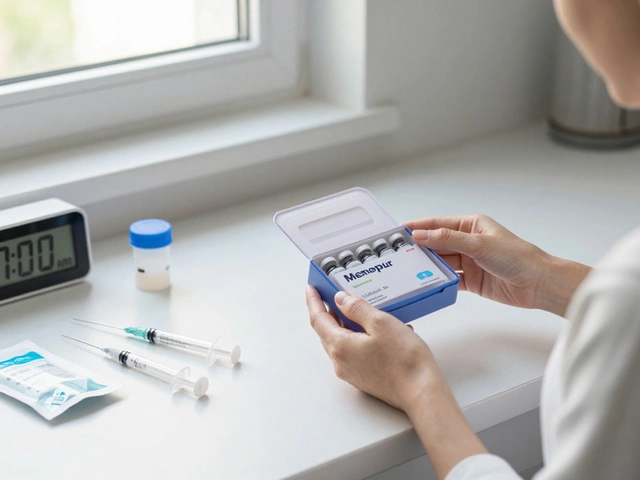Thinking about IVF? There's a lot more to it than meets the eye. While success stories shine brightly, there's a lot that goes on behind the scenes. Picture this: emotional ups and downs that rival your favorite drama series. Yup, that's part of the deal.
Money-wise, it's not just about the treatment cost. Unexpected expenses can sneak up on you like a cat in the night. Knowing what to expect can save you a boatload of stress later.
Let's talk health. Sure, it's a step towards creating life, but it’s also taxing on your body in ways you might not expect. Hormones, medications, procedures—the works. It’s important to know how this could affect you.
And here's the kicker: no one can guarantee success. It’s a mixed bag of hope, science, and a bit of luck. But facing the unknown? That takes guts. The more you know, the better you can tackle the uncertainties that come with it.
The Emotional Rollercoaster
When you think of IVF treatment, your mind might jump to the technical bits—medications, doctors' visits, and embryo transfers. But let's not forget the emotional journey that comes with it. It's often unspoken, yet massively impactful.
From the get-go, you're hit with waves of hope and anxiety. The anticipation of creating life is both exhilarating and nerve-wracking. You might feel a sense of isolation, especially if your close friends haven't taken the same path. The emotional toll? It’s similar to being on an unpredictable rollercoaster.
Expectations vs. Reality
Many enter the IVF world with sky-high hopes. With each cycle comes the belief that this could be the one. The reality, however, is that success isn't guaranteed. Globally, IVF success rates hover between 20-30% per cycle, depending on several factors, including age. It's a gentle reminder that patience and resilience are your best allies.
Building a Support System
Going through this without a solid support system can make the journey tougher. Partners, family, and friends play a crucial role. Some people find comfort in fertility support groups, connecting with others who truly get it. Talking about how you feel and sharing experiences can be therapeutic.
Coping Mechanisms
Handling stress is vital. Here are some tips to keep your emotional health in check:
- Mindfulness: Simple mindfulness exercises can help you stay grounded.
- Professional Help: Don't hesitate to reach out for professional counseling if needed.
- Healthy Lifestyle: Eating well, sleeping enough, and moving your body can boost your mood.
Navigating the emotional side of IVF is no small feat, but being prepared can make a world of difference. Understanding that these feelings are valid and seeking help when needed is crucial. Remember, you're not alone on this ride.
Financial Implications
Let's not beat around the bush - IVF treatment isn't cheap. Most folks don't realize just how fast the costs add up until they're knee-deep in receipts. On average, a single IVF cycle in the U.S. can set you back anywhere from $12,000 to $15,000. And that doesn't include medications, which can add another $5,000 or more to your tab.
Hidden Costs
Now, you might think these are the only costs you'll face, but there's more. Travel expenses for multiple clinic visits, consultations, monitoring appointments... it all adds up. Not to mention, some clinics charge separate fees for additional services like embryo freezing or genetic testing.
Insurance and Financing
Here's the kicker: unlike some medical treatments, IVF isn't always covered by health insurance. Even in states with mandated infertility coverage, the specifics can vary widely. It's crucial to contact your insurer and get the lowdown on what they will and won't cover before you start.
- Check if your insurance plan includes fertility treatments.
- If not covered, look into cash payment discounts or financing options that some clinics offer.
- Don’t forget to ask about refund or shared-risk programs, which can offer peace of mind financially.
Long-Term Considerations
Thinking about costs beyond the treatment? Consider the emotional and financial toll of unsuccessful attempts. Couples often prepare for one round but may need several, each with its own price tag. Planning for the long haul can save you stress when you're already in deep.
With all these expenses and the unpredictability of outcomes, some folks even choose to travel abroad for more affordable treatment options, weighing costs against risks and success rates. Ultimately, having a comprehensive financial plan and an emergency fund can make this journey less daunting.

Health Considerations
When diving into the world of IVF treatment, you need to know what could happen health-wise. It’s like preparing for a long road trip—understanding the terrain makes the journey smoother.
Hormonal Effects
First up, hormones. You'll be given medications to stimulate your ovaries, and this isn't a walk in the park. Expect mood swings, headaches, and bloating. It’s your body’s reaction to the chemical signals it's getting. Being aware of these changes can help you gear up mentally.
Procedure-Related Risks
The procedures themselves aren't without risk. Egg retrieval, for instance, is a bit like fishing—without the fun part. There’s a small chance of bleeding, infection, or damage to the bladder. Now, these aren't everyday occurrences, but worth keeping in mind.
- OHSS (Ovarian Hyperstimulation Syndrome): Sometimes the meds work too well, and your ovaries swell up. It can lead to weight gain and discomfort. Stay alert and communicate with your doctor if something feels off.
- Multiple Pregnancies: Twins can be a joy, but they also come with higher health risks and complications. Discuss the number of embryos you wish to transfer with your doctors beforehand.
Long-Term Health
What about the long haul? Well, the research isn’t crystal clear, but some studies suggest a slight increase in risks for certain health conditions over time. It’s crucial to have an open dialogue with your healthcare provider to understand any personal risks involved.
The Mental Impact
Finally, let’s talk about the mind. Health isn’t just physical—it’s a mental game too. The stress of the process, the waiting, and the uncertainty can be tough. Finding a good support system can make a world of difference. Counseling isn’t just for when things go sideways; it can be a proactive way to keep yourself grounded.
Navigating Uncertainty
Embarking on the IVF treatment journey can feel like you've stepped onto an unpredictable path. There's no crystal ball, and the truth is, outcomes can vary significantly for each individual.
Understanding the Odds
One thing to keep in mind is that IVF success rates aren’t a one-size-fits-all. Factors like age, health, and fertility history play a crucial role. For example, women under 35 have about a 39% chance per cycle, which gradually decreases with age. Checking with your clinic about their specific success rates can give you a realistic picture.
Preparing for the Unknown
Why's this important? Because knowing what could happen helps you set your expectations and plan ahead. Talking to a fertility counselor might be a good move to help process potential outcomes or setbacks. Having a strong support system is golden here, whether it’s friends, family, or online support groups.
Options and Adaptability
Your first choice may not always work out, and that’s okay. There might be other avenues to consider if things don’t go as planned. Options like egg donation or embryo freezing could be worth exploring. And remember, not every cycle results in pregnancy, and multiple cycles might be necessary.
Financial Backup
Consider setting aside a contingency fund. The initial cost of IVF treatment doesn’t always cover everything, and you might be facing unexpected medical bills.
Feeling uncertain isn't unusual. But equipping yourself with information, an adaptable mindset, and robust support can turn this challenging journey into an empowering experience.





